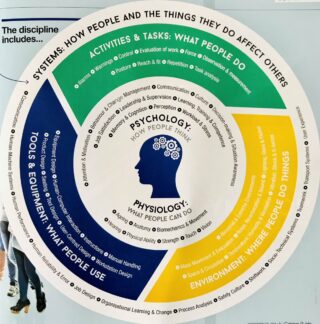Q Exchange
Community of Practice: Human Factors (HF) & Quality Improvement (QI)
- Winning idea
- 2019

Meet the team

Paul Bowie

Alastair Williamson
Katie Edwards

Ruth O’Dowd

wendy halliburton

Barbara Hercliffe
Clare Crowley

Dominic Furniss

Sharon Hamilton

Wendy Lewis

William Lea
David Cochrane
Also:
- Bryn Baxendale
- Alex Lang
- Giulia Miles
- Sue Hignett
- Helen Vosper
- Alastair Ross
- S Paterson-Brown
- Nikki Davey
- Rebecca O'Leary
- G Forman
- Wendy Lunn
- D McNab
What is the challenge your project is going to address and how does it connect to your chosen theme?
Realising the benefits of HF in healthcare presents challenges in terms of building capability and capacity in related concepts and methods amongst professionals with leadership, safety, quality, productivity and wellbeing responsibilities. Access to HF expertise is limited as most work in other safety-critical industries. The challenge is to integrate and grow UK-wide HF and QI professional networks and build relationships and joint capabilities in selected theories and practice from each discipline. Both professional groups seek in different but sometimes overlapping ways to improve how human work is designed and performed to enhance system performance and the health & wellbeing of people. We aim to develop joint discipline capabilities by sharing our learning, designing a joint educational resource and testing a ‘hybrid’ conceptual approach to healthcare improvement. The desired CoP acts as a ‘ professional hub’ to bring us together and achieve these goals in a sustainable way.
What does your project aim to achieve?
Objective 1: To integrate and grow regional HF networks and CoPs with a specific emphasis on engaging with the Q membership and the aforementioned professional groups. Objective 2: To explore with the CoP the development of a HF toolkit to enhance scope, and add value, to existing improvement concepts and methods. Objective 3: To build on early development work between the HF & QI expert communities to gain consensus, validate and test a hybrid conceptual model and design related case studies to inform wider learning. Objective 4: To evaluate the overall utility of our proposal in work led by a Health Foundation-trained CoP specialist with support from the NES Safety & Improvement Research team.
Improvement benefits will be accrued by both communities in broadening understanding and application of ‘new’ concepts and tools to better inform how care system performance and human wellbeing can be jointly optimised. A theory-informed evaluation will unpack this and measure impacts.
How will the project be delivered?
NES will lead in close partnership with a large and diverse range of NHS organisations, professional bodies, regional networks and academic institutions representing HF, Q members and wider QI/Safety/Wellbeing UK communities. For example, Q and CIEHF HF special interest groups, Nottingham University Hospitals NHS Trust, ASPiH, University Hospital Birmingham Foundation Trust, North Cumbria University Hospital NHS Trust, NHS Lothian, North Tees and Hartlepool NHS, Scottish Ambulance Service, Glasgow University, Robert Gordon University, Oxford University Hospitals NHS Foundation Trust, Norfolk and Norwich University Hospital Foundation Trust, Teesside University, York Teaching Hospital NHS Foundation Trust, Loughborough University, Edinburgh University, CoP HFE North East and North Cumbria/AHSN NENC, CHFG, AQuA. Each partner has additional resource e.g. people, communications support etc to cover risks & funding shortfalls. Project governance and accountability will be overseen by NES
What and how is your project going to share learning throughout?
The project will generate and share learning on the synergies between HF and QI and related testing and evaluation in the following ways:
– A fully open access and interactive online community of practice for HF integration with Q members, quality, risk and safety communities, and wider NHS – sharing, learning, interaction and blogging on project related matters
– A series of partner and wider national stakeholder workshops to address, agree, plan, and progress the project outcomes
– Traditional email communication, video and teleconferencing between project partners
We will also use the organisational communications and online web teams from our national partners to publicise our project, grow the member network, highlight progress updates and promote our resources and outputs.
Publication of newsletters, articles, mail chimps and blogs for the CoP and wider NHS and Social care communities
Publication of evaluation outputs in international peer reviewed journals
How you can contribute
- While the core team is highly experienced and expert in HF/QI concepts, practice and project management, and in leading Health Foundation-funded projects, we seek help in the following areas:
- - Wider engagement with interested Q members beyond the special interest group
- - Leading experts in QI theory and practice with a specific interest in Human Factors
- - Clinical input for testing of QI-HF hybrid method and design of case studies and HF training toolkit (NES does have good access to frontline care organisations and teams, but wider UK interest is important)
- - NHS leadership and Simulation-based training leads input to support application of project objectives in care settings to test out the concepts and tools and also to align and integrate HF and QI at the service and training levels
- - Communication, promotion and design expertise to help promote the project, and its findings across appropriate media (to engage those with novel ideas to better achieve our goals)
Plan timeline
| 1 Jan 2020 | Design and populate online CoP content (already begun) |
|---|---|
| 1 Jan 2020 | Virtually convene meeting of Lead CoP HF and Q Members |
| 1 Feb 2020 | Finalise design of projects to develop, test and evaluate |
| 1 Feb 2020 | Formal launch of online CoP to NHS via comms networks |
| 1 Feb 2020 | Workshop for Lead CoP Group to agree work plans |
| 2 Mar 2020 | Development, testing and evaluation phase |
| 1 May 2020 | Add online content and promote membership monthly |
| 1 Jun 2020 | Workshop - Lead CoP Group to review progress/share learning |
| 1 Sep 2020 | Data analysis and early reporting phase |
| 1 Dec 2020 | Final meeting of CoP group of HF and Q experts |
| 1 Jan 2021 | Finalise data analysis, publication and sharing learning |
Project updates
7 Jun 2020
Project Update – Our Q Exchange project is about to restart and be refreshed after a slow start due to an ‘administrative error’ by my own organisation (NES) which delayed receipt of funding from the Health Foundation (apologies to colleagues for this oversight). Just as we were about to start the project after this initial delay the Covid-19 pandemic struck causing further delay.
However, during this time progress has been made in meeting our project objectives in the following areas:
Governance – the project is registered with NES and is on a list of our scholarly activity , while oversight is undertaken by our Safety, Skills and Improvement Executive Board. Our directorate management accountant provides financial oversight and support with the project budget.
Communication – The NES communications team issued a short press release to promote the project and have also been active on social media, along with those involved in the project development, in further promotional activity. We will repeat these tasks in coming weeks as we relaunch the project. Two short articles celebrating the project award and describing our goals were published in the NES medical deanery newsletter and our main organisational newsletter. The project lead has also met with the Q lead in Scotland and will follow-up regarding the holding of a joint event in coming months. Similar events where/are also planned in Northern Ireland, Wales and selected English regions as part of our objectives. Finally, we have begun to compile a network list of key stakeholders that we can engage with and make aware of the out project ambitions and outputs.
Human Factors Online Resource – We have begun to develop and heavily promote our online community of practice involving Q members and Human Factors specialists and others here: www.knowledge.scot.nhs.uk/hfe.aspx. As well as acting as a CoP, the ambitious goal here is to eventually develop the world’s foremost online presence for all things Human Factors in health and social care. The site as it stands contains many downloadable resources for Q members/QI advisors and health and social care teams to consider and use. Links to educational materials and signposting to other resources of interest are also uploaded to the site. Work will continue over the next 6-months to attract as many visitors as possible and to populate the online resources.
Human Factors Toolkit – We have tentatively agreed on the contents of a draft toolkit for applying Human Factors thinking and methods (e.g. Hierarchical Task Analysis) in health and social care by non-specialists with minimal training. This work was led by a group of professional Ergonomists who make up LANTERN – a specialist interest group for healthcare HF educational development which is part of the chartered institute of ergonomics and human factors (CIEHF). The group membership also contains Q members who are qualified HF specialists as well as senior clinicians with a leadership role and responsibility for Human Factors. After final agreement on toolkit content we will seek to promote, test and evaluate this intervention.
Covid-19 Response – While things haven’t gone to plan there have been some unexpected successes. During the pandemic, project leads and other Q members where involved in the rapid development and launching of guidance for health and social care teams on how to design usable work procedures. This will be useful both in the immediate response to the pandemic but also beyond this as we design new ways of working. The good practice guidance can also be used to review and update existing procedures. Currently a small team are identifying examples of well-designed procedures by care teams who applied the guiding principles as a means of educationally illustrating their usefulness to others. The guidance can be downloaded here: https://covid19.ergonomics.org.uk/
The same team is currently working on developing guidance on organisational learning using a systems perspective, which will be of strong interest to the Q community and beyond.
Key Learning and Successes – During this extremely difficult period for many, there has also been unexpected upsides such as the earlier guidance development highlighted. This would have been unlikely to have happened so quickly and with so much expert input during ‘normal’ times. The use of MS Teams (despite some of its technical limitations) has been absolutely fulcrum to communication, development and innovation processes and the Q Exchange project team will need to make significant use of this technology from now on ‘to get the job done’.
Next Steps – To reconvene the project team (virtually using MS Teams) in June to review and kick-start the project given that timelines have slipped. Importantly a key task will be to explore how we deliver much of our project activity given that a great deal of it involved travelling to face-to-face meetings such as workshops.
Comments
Barbara Hercliffe 3 Mar 2020
Hi Paul
I am conscious I haven't been in touch , is there any update , I am keen that we stay connected and engaged in this project.
thanks
Barbara
Nichole McIntosh 14 Nov 2019
Congratulations! This is a fantastic project. I am keen to learn more about the outcomes and where it leads in relation to the development of the Community of Practice for Human Factors and QI leaders. #BrilliantBasics
Paul Bowie 19 Nov 2019
Many thanks for your interest and support Nichole, my email is paul.bowie@nes.scot.nhs.uk if you wish to follow-up
best wishes
Paul
Mary Salama 17 Oct 2019
Well done team!
Keen to be part of your initiative from Birmingham Womens and Children’s NHS trust!
Paul Bowie 20 Oct 2019
Great to know and delighted to collaborate in future - many thanks Mary
best wishes
Paul
Mark Kelly 14 Oct 2019
A national HF CoP is a fabulous idea - resources for sharing knowledge skills and experiences in HF's is much needed and vital if we are to continue learning from events as organisations in a positive learning system.
Paul Bowie 20 Oct 2019
Really appreciate your support and feedback Mark - many thanks
best wishes
Paul
Corrina Davies 9 Oct 2019
Really pleased to see this project bringing HF and QI together in practice. So many synergies here and a real need to cross professional boundaries to develop networks in the interests of patient safety. I will be watching this one as it's going to have an impact on national strategy; a HF approach to incident investigations is very much needed and well overdue. This is a network that I can see working with Deaneries and HEE to influence practice from the start.
PS - I'm an NHS manager with BA in Organisational Behaviour, PgDip in Patient Safety and a huge respect for the HF work undertaken by anaesthetists.
Paul Bowie 9 Oct 2019
Thank you Corrina - starting to make in-roads with NES, HEE and professional bodies and our Q/QI colleagues but lots more work to do. Please get in touch if you wish to become involved if we are successful - paul.bowie@nes.scot.nhs.uk
best wishes, Paul
Elizabeth Bradbury 1 Oct 2019
I'm supportive of this work as it could provide a really helpful narrative linking HF and QI work that I think is lacking currently. It could easily be aligned with the NHS (England) Patient Safety Strategy. It might be helpful for you to link with local HF expertise, AQuA has done alot on this, if it would be useful to know more contact me and I can introduce you to our HF lead Elizabeth.Bradbury@srft.nhs.uk
Paul Bowie 7 Oct 2019
Many thanks Elizabeth, I'm speaking at an AQuA event in December, I'll drop you an email, best wishes, Paul
Barbara Hercliffe 20 Sep 2019
so pleased to be part of this from Norfolk and Norwich we have a growing community of practitioners with HF and QI expertise and look forward to contributing and testing the HF toolkit through our new Quality Improvement Academy.
Paul Bowie 22 Sep 2019
Many thanks Barbara - fingers crossed!
wendy lunn 28 Jul 2019
Really excited to be involved with this. Our regional Community of Practice for HF (North East & North Cumbria) is growing in numbers and one area of significant interest is HF education and how we raise awareness across the board at all levels, keep a consistent level of training across organisations, and develop more bespoke higher levels of training for those who need it, such as incident investigators. We hope our members, with their knowledge and expertise, will contribute to the project and that the outputs will stretch beyond our own region; including the building of networks with other COPs; the development of a HF toolkit, and the linking of HF to QI to inform wider learning and drive improvements in systems, staff satisfaction and patient safety & experience.
Anna Burhouse 26 Jul 2019
Great idea and it’s lovely to see everyone’s supportive comments. Do you think there is any benefit in linking up or making contact with any of the other QExchange ideas? There seems to be some great potential for synergy.
Good luck
best wishes
Anna
Paul Bowie 26 Jul 2019
Many thanks for your support Anna - do you have any specific QExchange ideas in mind?
best wishes
Paul
Ruth O’Dowd 23 Jul 2019
I really like this idea, I have a particular interest in HF based incident investigation to deliver improvements in safety. I would be happy to link in. Ruth
Paul Bowie 25 Jul 2019
Excellent many thanks Ruth!
Wendy Lewis 22 Jul 2019
Great project that I'd be really pleased to support. I'm very interested in the overlap between QI and HF and confidence to operate in this space would be a benefit.
Paul Bowie 25 Jul 2019
Good to hear Wendy, many thanks, that's exactly what we're aiming for
best wishes
Paul
David Cochrane 17 Jul 2019
As Jimmy Noak has indicated, various senior staff at Broadmoor Hospital and West London Forensic Service (part of West London NHS Trust) recently participated in a 3-day Train the Trainer programme, with a view to delivering an ongoing programme of 1 day Human Factors training for multi-disciplinary colleagues. This is collaborative work with Imperial College Health Partners. The Trust previously benefited from a thematic analysis of Serious Incidents undertaken by Dr Jane Carthey. We are keen to develop bespoke HFE materials for Forensic Mental Health Services and then generic Mental Health Services. So networking opportunities would be welcomed.
Paul Bowie 22 Jul 2019
Excellent many thanks David - I'm sure your goal is achievable and fits neatly with our idea of developing a HF toolkit for 'no-specialists' that can inform and enhance existing QI approaches etc.
Jimmy Noak 17 Jul 2019
Looks like a very good project, would be keen to link into this work, just started some work on HF training, and have QI work on-going; great opportunity to increase collaboration and networking between HF, QI.....Best wishes Jimmy
Paul Bowie 22 Sep 2019
Thanks Chantelle, delighted to collaborate as we clearly share the same goals in this area, If successful we'll arrange an initial learning event to bring all interested collaborators together etc. Fingers crossed! Paul
Chantelle Tomlinson 21 Sep 2019
This sounds super. We started a similar HF training journey in the North in 2015 and our team are passionate to share our growing experience. If and where we can, our goal is in collaborating to avoid teams and Trusts spending large sums on commercial external training. We’d love to help build HF training capability within the NHS, for the NHS.
Paul Bowie 22 Jul 2019
Many thanks for your support Jimmy, we'll be in touch with updates on progress, best wishes
Paul
Peter Isherwood 12 Jul 2019
Excellent initiative, great opportunity to both increase collaboration between the multiple different HF groups referenced already (and the CHFG) and between QI and HF itself.
"HFE is the compost in which QI grows"
(wish it was my quote but comes from Henry Otero, Executive & Tranformation Sensei, Virginia Mason)
Paul Bowie 25 Jul 2019
many thanks for your support Peter, good to hear we've got the same goals
cheers
Paul
Alastair Williamson 4 Jul 2019
Great project to build on existing informal and some fledgling formal networks around human factors and ergonomics in the NHS, such as Q Community HF SIG, CIEHF SIG and regional Communities of Practice around HFE in Healthcare.
The opportunity to develop a hub for HF practitioners and QI experts both within the NHS and outside to link/network and discuss programs of work supporting HFE integration into service improvement is something that we need to grasp hold of to support the recently launched NHS National Safety Strategy in England. This hub will be a resource for any health and care professional to see the benefit of including a 'ergonomic' lens on quality improvement, especially within the design of systems.
Melanie Newton 2 Jul 2019
As a member of the CoP HFE North East and North Cumbria/AHSN NENC, i am really excited to be involved in this project and looking forward to reading comments and suggestions.
Paul Bowie 25 Jul 2019
Many thanks Melanie/Alastair - let's hope we can get something of the ground with or without funding, although more difficult without the resource!! Speak soon, thanks again, P
Alastair Williamson 4 Jul 2019
Just starting the development of a COP for Human Factors and Ergonomics in Healthcare for Midlands and East - linking into your network plus others around the country so important to see who is doing great work out there and spread it.
Comments are now closed for this post.